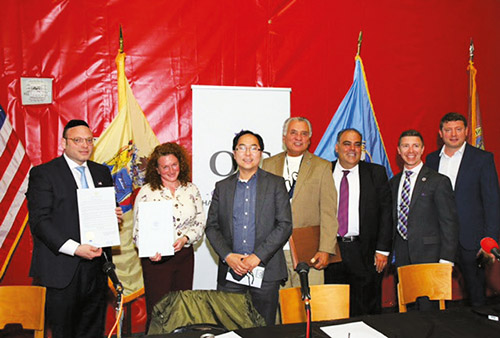

(Courtesy of OJCC) For the first time, the Garden State marked the second Monday in May as New Jersey Economic Development Day, the unique initiative to promote commerce taking on new meaning in the wake of the pandemic that left economies devastated and businesses of all kinds struggling to survive.
New Jersey business owners have been eagerly anticipating an opportunity for commercial resurgence; and federal, state and local officials came to show their support for business development at a free event sponsored by South Toms River, the Orthodox Jewish Chamber of Commerce and the Central Ocean Business Association, marking May 10 as the official launch of Economic Development Day. 150 business owners, prospective employees, elected officials and community leaders turned out at Adrenaline Sports Academy in South Toms River with many more joining livestreams on Zoom and Facebook. In addition to featuring a job fair, exhibit tables and networking opportunities, the event included a highly anticipated panel discussion on business in the post-pandemic recovery period, moderated by John Crisafulli.
The panel included Congressman Andy Kim, who made headlines after spending nearly two hours cleaning up the Capitol Rotunda and surrounding areas following the January 6 riots; Governor Phil Murphy’s Deputy Chief of Staff Deborah Cornacava; Ocean County Commissioner Joe Vicari; Orthodox Jewish Chamber of Commerce Founder and CEO Duvi Honig; South Toms River Business Administrator Joe Kostecki; South Toms River Mayor Greg Handshy; and Municipal Cards CEO Eli Weingarden. The panelists spent more than an hour discussing topics including pandemic-related trends, advice for new startups and the impact of unemployment benefits on businesses looking for new hires. (Click to watch: https://youtu.be/A8AgQHNpgpk).
A staunch proponent of Economic Development Day, Governor Murphy sent Cornacava to deliver opening remarks in his stead. She praised the Orthodox Jewish Chamber of Commerce for stimulating economic growth, activity employment, ingenuity and innovation in New Jersey; and presented Honig with a gubernatorial proclamation heralding his dedication and commitment to bolstering economic development in New Jersey, thereby strengthening the state’s economic, social and cultural fabric. (Click to watch: Presentation https://youtu.be/3AbPqsXhMrk).
A second proclamation issued to Honig by Ocean County Board of Commissions Director Gary Quinn cited Economic Development Day as a vehicle for promoting Ocean County’s 13,000 businesses and its $5 billion tourism industry which creates over 40,000 jobs each year, improving the county’s long-term fiscal health.
The Economic Development Day celebrations were also enhanced by the presence of Jackson Chamber of Commerce 1stVice President Anthony Canderozzi, Jackson Chamber of Commerce President Steve Chisholm, Ocean County Health Department and Lacey Township Mayor Peter Curatolo, Ocean County College Manager of Business Engagement Michael Angelo Forcella, District Director to Congressman Andy Kim Ben Giovine, Central Ocean Business Association President Louisa Kasper, Ocean County Business Development and Tourism Division Director Sandra Lazzaro and New Jersey Jewish Business Alliance founder and CEO David Rosenberg.
While the event may have been inspired by the Orthodox Jewish Chamber of Commerce, it was an all-inclusive effort, one that was all about building relationships that bridge cultural and communal divides, with a greater goal of empowering others. Those in attendance proclaimed the celebration a huge success, the unilateral support of federal, state and local officials making clear their support for expanding Economic Development Day throughout New Jersey, capitalizing on an important opportunity to evaluate existing programs and eliminate those that are no longer relevant, in order to free up funding for new initiatives that are more in tune with current realities and economic conditions.
“Coming together in-person was, and still is essential, for our economy to recover,” said Kostecki. “Our businesses need employees, and a space to network. We were enthusiastic to host, with support from our C.O.B.A, and the Orthodox Chamber of Commerce network.”
New Jersey is the first state to designate an annual Economic Development Day, prompting others to begin exploring similar initiatives. Several Garden State groups and chambers have already scheduled Economic Development Day Events on their 2022 calendars, to further promote business in their local communities.
“We want to see every community throughout New Jersey hosting similar platforms for business development and job creation,” remarked Honig, who is working together with the state and the governor to create a community of business leaders in different industries, helping to empower them individually as well (click to watch. https://youtu.be/CfPfg6NZIrM
Seven years in the making, Economic Development Day is the brainchild of Honig, who recalled one Labor Day when the Orthodox Jewish Chamber of Commerce was hard at work helping those who were unable to take time off and celebrate with their families. That reality sparked the idea of creating a day of empowerment, where those in business and the workforce could take advantage of networking opportunities and initiatives that would allow diverse businesses to collaborate and grow, ensuring that future Labor Days could be observed by all. After years of advocacy, a bill to create Economic Development Day was passed unanimously by both houses of the State Legislature before being signed into law by Murphy in 2019, although last year’s originally scheduled event was cancelled because of the pandemic.
The May 10th celebration was just the latest in a string of efforts by the Orthodox Jewish Chamber of Commerce to promote business and stimulate economic opportunity. The United States Labor Department recognized the Orthodox Jewish Chamber of Commerce in January for its efforts bringing about significant policy changes at the federal level that opened grant applications for job training programs to faith-based community organizations throughout the country. Under the new rules, a specified number of applications would have to come from organizations that have not received a competitive grant within the last five years, paving the way for new applicants to participate in the programs which were often monopolized by larger organizations.










